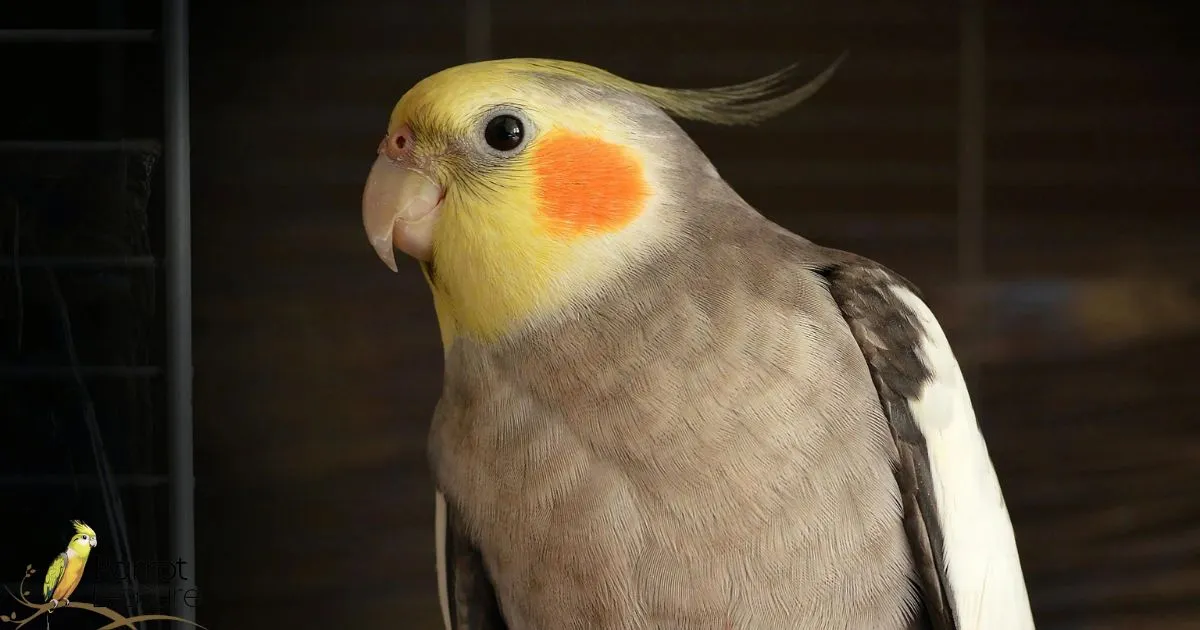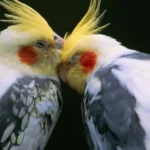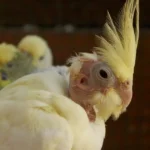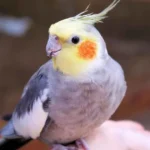Cockatiel food encompasses a balanced mix of pellets, seeds, fruits, and vegetables. Ideally, a cockatiel’s diet should mirror what they would find in the wild: a variety of seeds, fruits, and greens. Providing a nutritious blend that supports their health and vitality is essential.
Curious about your feathered friend’s diet? Have you ever wondered, What Foods Are Toxic to Cockatiels? Ensuring the safety and health of your cockatiel starts with knowing what’s on their menu. Stay tuned as we delve into the foods that could be harmful to your pet.
While cockatiels can enjoy many of the same foods as humans, certain items are dangerous for them. Toxic foods include chocolate, avocado, garlic, and onions. These can cause serious health issues, so keeping your cockatiel’s diet safe and suitable is crucial.
Introduction to Cockatiel Care: Avoiding Toxic Foods
Adventuring on the journey of cockatiel ownership brings joy and fellowship. However, it’s important to be aware of toxic foods that can endanger your pet’s health. Food like Avocado, chocolate, caffeine, etc are harmful and should never be part of a cockatiel’s diet. These substances can lead to severe health complications or even be fatal to your bird.
In contrast, a diet rich in pellets, vegetables, and occasional fruits is beneficial for your cockatiel. Ensure that all fresh produce is thoroughly cleaned to remove pesticides. Treats should be given sparingly, focusing on healthy options like cooked eggs and grains. By avoiding toxic foods, you’ll contribute to a long, vibrant life for your feathered friend.
The Cockatiel Diet: Understanding What’s Safe
A healthy cockatiel diet is diverse, mirroring their natural intake in the wildPellets should form about 40% of their diet, providing essential nutrients. Seeds, though enjoyed by cockatiels, should be given in moderation as part of a 30% seed mix. Fresh vegetables and fruits should make up 25% of their meals, offering vitamins and variety.
It’s vital to avoid foods like avocados, chocolate, onions, garlic, and fruit seeds and pits (apple seeds and peach pits) that are toxic to cockatiels. Never feed them these foods, as these can be lethal. Instead, safe protein sources like cooked eggs and small amounts of lean meat can be included.
Always ensure fresh water is available. Remember, a balanced diet is key to a cockatiel’s health and longevity.
Common Household Foods: What Cockatiels Should Never Eat
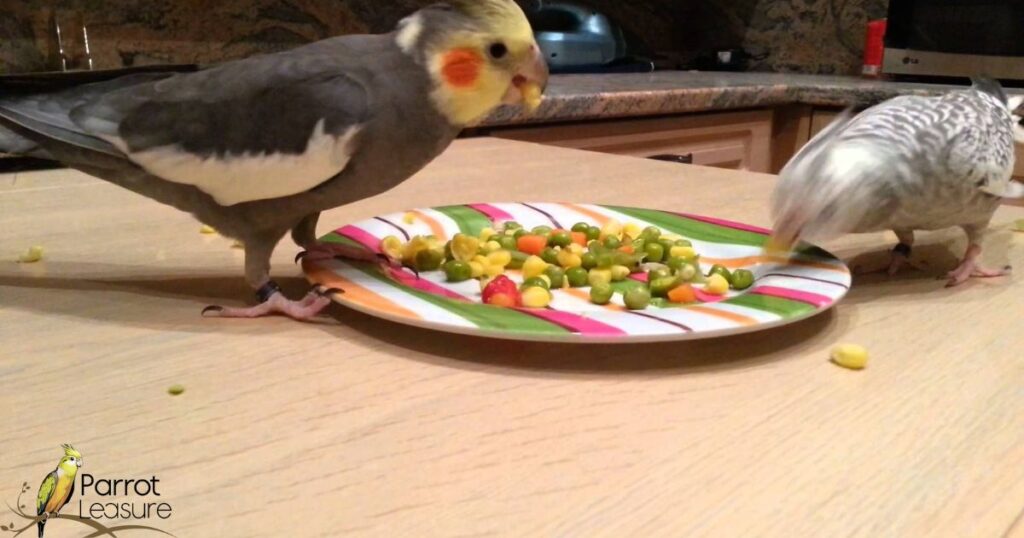
Cockatiels are charming companions, but certain foods can be dangerous for them. Avocado is a big no-no, it contains a toxin that can cause heart failure in birds. Chocolate and caffeine are also harmful, potentially leading to seizures or death. Even garlic and onions can cause anemia, so it’s best to keep these out of reach.
In addition to these, avoid giving alcohol, salt, and sugar-rich foods, which can disrupt a cockatiel’s delicate balance. Dairy products are not recommended, as birds cannot process lactose properly. And while some nuts are fine, macadamia nuts are toxic to cockatiels. Always ensure fresh water is available, and stick to a vet-approved diet for your feathered friend1.
Cockatiel Health Risks: Identifying Toxic Food Symptoms
When cockatiels ingest toxic foods, the symptoms can be alarming. Avocado can cause difficulty breathing and fluid buildup around the heart. Chocolate ingestion leads to seizures, and onion or garlic can result in anemia and lethargy. If your bird consumes these, seek immediate veterinary care.
Watch for signs like weakness, loss of appetite, or unusual droppings after they eat raw potatoes or eggplant, as these contain solanine, a toxic compound. Regular monitoring and a safe diet are crucial for your cockatiel’s health. Always consult with a vet for a bird-safe food list.
Related Post: How long Do Cockatiels Live?
Cockatiel Nutrition: Steering Clear of Dangerous Snacks
Cockatiels thrive on a balanced diet, but some snacks can pose risks. Chocolate, avocado, and caffeine contain substances that are toxic to birds. Garlic and onions can cause blood disorders, and dairy products are hard for them to digest due to lactose. It’s crucial to avoid these to maintain your cockatiel’s health.
For safe snacking, offer pellets, budgie seed mix, and a variety of vegetables and fruits in moderation. Treats should only be 5% of their diet, with pecans and pumpkin seeds as healthy options. Always consult with a vet to ensure the snacks are suitable for your feathered friend.
Safe Alternatives: Healthy Treats for Your Cockatiel
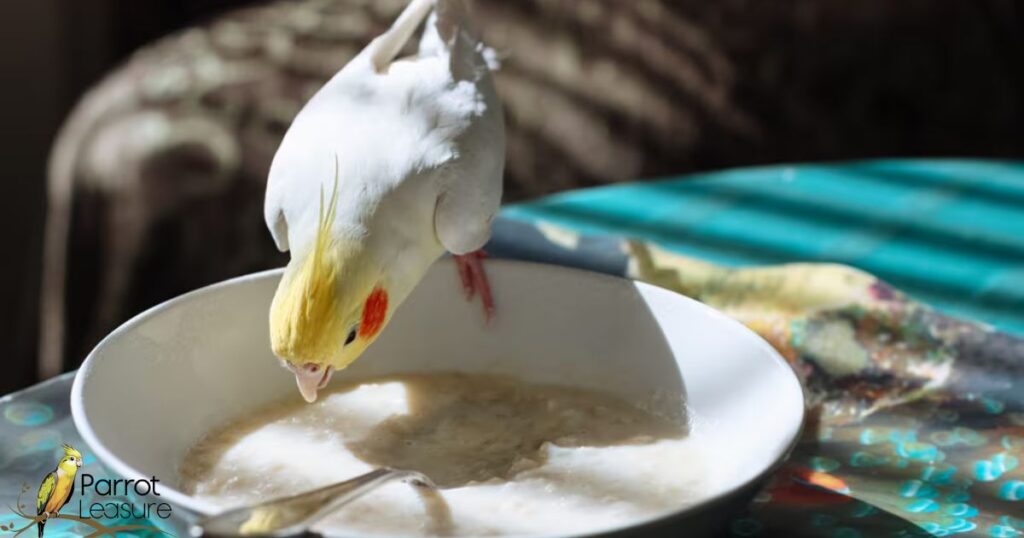
For a happy and healthy cockatiel, which can live long with proper care, offer a variety of organic, seedless fruits such as bananas, apples, and grapes. Ensure fruits are thoroughly washed to remove pesticides and always remove any seeds or pits, as these can be harmful.
In addition to fruits, incorporate vegetables, leafy greens, and cockatiel pellets into their diet for balanced nutrition. Consult with an avian vet to tailor your cockatiel’s diet to their specific needs, ensuring they receive all essential vitamins and minerals.
Cockatiel Feeding Tips: Preventing Accidental Poisoning
To prevent accidental poisoning, always keep chocolate, avocado, and caffeine away from your cockatiel, as these are toxic to birds. Also, avoid giving them fruit seeds, onions, garlic, and mushrooms.
Ensure all foods are fresh and free of pesticides before offering them to your cockatiel. Regularly clean their food and water dishes to prevent bacterial growth and potential health risks.
The Cockatiel Pantry: What to Keep and What to Discard
Stock your cockatiel’s pantry with high-quality pellets, budgie seed mix, and a variety of fresh vegetables. These staples ensure a balanced diet, providing essential nutrients for your feathered friend.
It’s crucial to discard dairy products, sugary treats, and fatty foods, as these can harm your cockatiel’s health. Always check for freshness and remove any spoiled or moldy items to prevent health issues.
Cockatiel First Aid: Responding to Toxic Food Ingestion
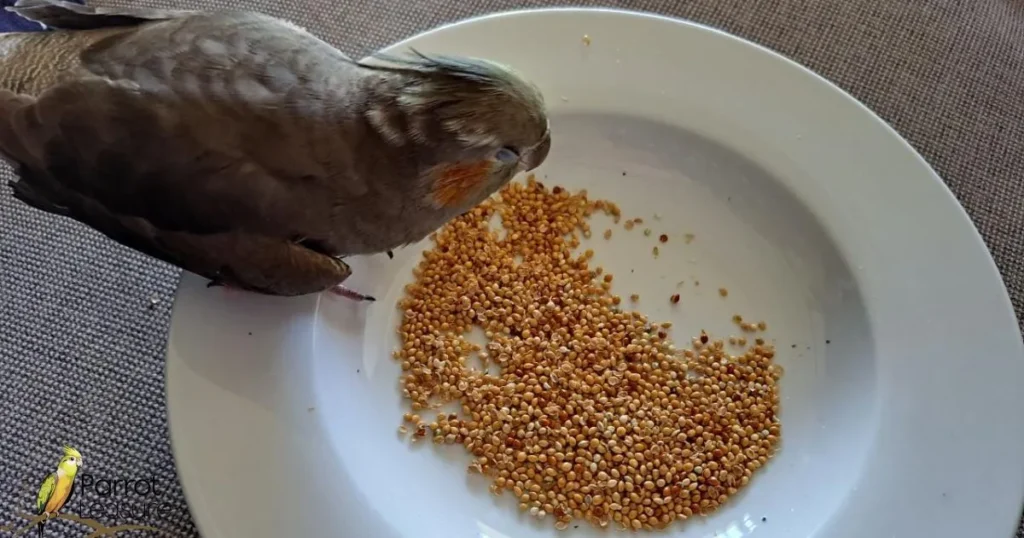
If your cockatiel ingests toxic food, observe for signs of distress such as regurgitation or disorientation. Immediate symptoms may include bloody stools, redness around the beak, convulsions, or shock.
Act quickly by identifying the ingested toxin and take it along with your cockatiel to an avian vet. For non-emergency ingestion of small toxic items, activated charcoal can be offered as a first-aid measure.
Educating Cockatiel Owners
Educating cockatiel owners starts with understanding the bird’s natural behavior and dietary needs. Cockatiels are social, and intelligent, and require a balanced diet of pellets, seeds, vegetables, and occasional fruits.
Owners should also focus on enrichment and mental stimulation, which includes training, taming, and providing a spacious cage with toys. Regular vet check-ups and learning to read your cockatiel’s body language are essential for their well-being.
FAQ’s
What do cockatiels love to eat?
Cockatiels enjoy a range of foods, including commercial birdseed, pelleted food, vegetables, fruit, and the occasional treat.
Can cockatiels eat tomatoes?
Yes, it is safe to feed cockatiel vegetables like cherry tomatoes or cucumbers.
What smells are bad for cockatiels?
Spray cleaners, hair spray, perfumes, incense and even candle fumes can irritate birds’ lungs and air sacs.
Do cockatiels eat all day?
Birds tend to eat little and often throughout the day. They typically feed well in the morning (at least mine do because that’s when I feed them) and then they will snack on and off the rest of the day.
What are cockatiels’ favorite vegetables?
Apples (without seeds!), bananas, oranges, carrots, peppers, broccoli, corn on the cob, dark green lettuces, and peas are just some of the fruits and veggies your Cockatiel may enjoy.
Final Thoughts
Owners must be vigilant about their cockatiels’ diet. Foods like chocolate, avocado, and onions can be harmful. It’s crucial to stick to a diet that’s safe for these birds. Ensuring this will keep the cockatiels healthy and active.
